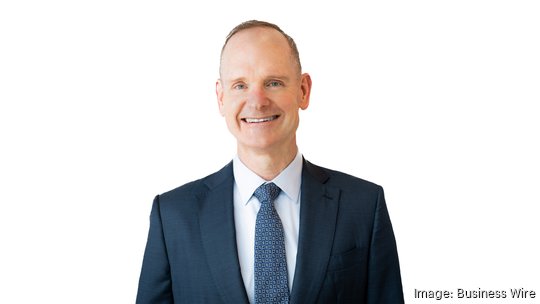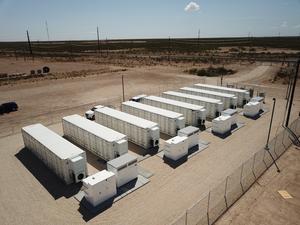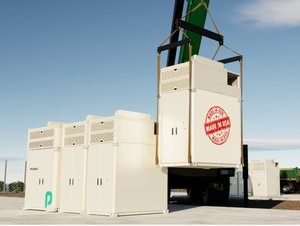
Powin's new CEO isn't committing to taking the company public, let alone setting a timetable for making it happen. But preparing for the possibility is a thing for the Portland metro battery energy storage system integrator.
"One of the phrases we use internally is 'getting Powin IPO-ready,'" Jeff Waters said Tuesday. "It doesn't necessarily mean we're going to IPO. But it means that we're going to get all the things in place so that if at some point the public markets are a good fit for new capital that we need to bring in, that we're capable of doing that, of going public."
Waters was named CEO in August, taking the reins from Geoff Brown. Brown led Powin for seven years, growing an inchoate grid-battery business into a top 10 global player and taking the company private along the way.
Private equity firms that have poured at least $235 million into Powin now control the company that Joseph Lu founded more than 30 years ago to source consumer products in China for American retailers.
Those backers haven't dictated a pathway for financing growth, Waters said.
"I wouldn't say there's no pressure from the board," he said. "I'd say the board would be just as fine growing it as a private company as they would public. They're money people, so they'll always be looking at what's the best outcome, both for the company but also the investment they've made.
"It's kind of a great situation where you don't have a board that's pressuring you one way or another and you've got the opportunity very likely to go either path and you can pick the one that's more attractive as the opportunity hits you."
Becoming less 'chunky'
One aspect of becoming "IPO-ready" is getting finance and legal mechanics up to Securities and Exchange Commission snuff. More challenging perhaps is achieving and managing growth that is counted on to smooth Powin's revenue picture.
Waters described Powin sales as not exactly unpredictable but "chunky" in a way that wouldn't fit well with public-market expectations for annual forecasts and quarterly guidance.
"Getting more revenue growth than where we are today will help work out some of the bumps," he said.

Waters declined to reveal revenue figures but noted Powin has deployed 3 gigawatt-hours of energy storage systems and has 12 gigawatt-hours "in current construction, and you can think about current construction happening over the course of a year."
Publicly traded Fluence recently valued 1.4 gigawatt-hours of 2023 orders at $565 million. Using that as a guide, Powin's 12 gigawatt-hours would convert to around $4.8 billion of business.
Fluence, by the way, was first on a recently published S&P Global list of the top five system integrators, based on installed and contracted systems. Powin didn't make the list.
Knocking at the door
Waters said the company probably ranks "in the seven, eight or nine range" currently, but added: "If you look at the number of projects that we have that are in construction today, my expectation is that we'll be probably knocking at the door of the top 5."
The growth is fueled by a transition to renewable energy that makes storage an increasingly beneficial if not necessary grid resource. Portland General Electric, for example, is adding nearly 2 gigawatt-hours of storage locally in the next couple of years, including 1.1 gigawatt-hours that it will buy at a cost of $510 million between two systems. The system supplier for those projects hasn't been revealed.
These systems rely broadly on lithium-ion battery technology and generally provide two-to-four hours of output. Longer-duration storage companies like Wilsonville-based ESS, whose output can extend into double-figure hours, are trying to edge their way into the picture. Waters views those systems as complementary, not so much competitive.
Waters also doesn't view questions about the safety of lithium-ion batteries as a threat. One Powin system in Warwick, New York, in June caught fire, and another at the same site "experienced problems," according to the project developer. The fire was contained and Powin said months ago that a manufacturing defect was quickly identified and fixed.
"There are a lot of things to ensure that you're not going to have fires rampaging across multiple energy stacks and across a site and having a dramatic impact on a community," Waters said. "It'll stay contained, if and when it does happen."
A 'scale person'
Waters is a veteran chief executive who led solar panel maker Maxeon Solar Technologies for two years until October 2022, guiding it through a spinoff from San Jose-based SunPower. He sees the overlap in customer bases for the two companies — solar projects often come with storage — as one factor that will help him in guiding Powin.
His experience in scaling companies is another. Maxeon doubled revenue in his tenure, he noted, as the company went from "a comfortable niche into really expanding into some higher-growth markets."
"Most CEOs are really good at the startup side of things, and some are really good at the scale side of things," he said. "I've been more of a scale person."
Waters and his family remain in San Jose, not wanting to uproot a son who is a junior in high school. But the CEO said he's in Portland frequently, adding that he would be getting on a plane Tuesday evening.
About 200 of the company's 400 employees are based in the area, most at a Tualatin headquarters and also at an office in the Pearl.
"It's really a substantial part of our footprint," Waters said of Powin's Portland metro workforce. "And it'll continue to be the biggest concentration of employees we have going forward."







